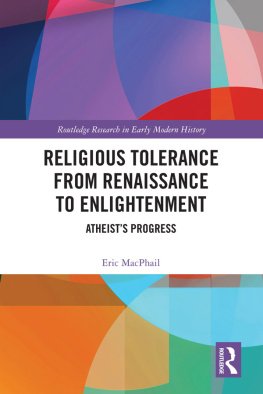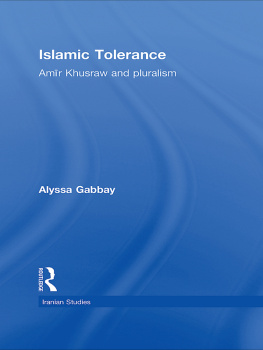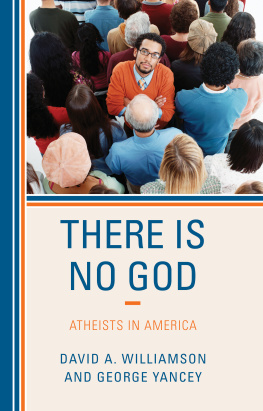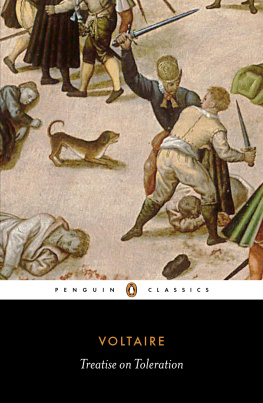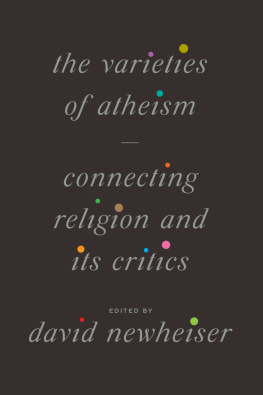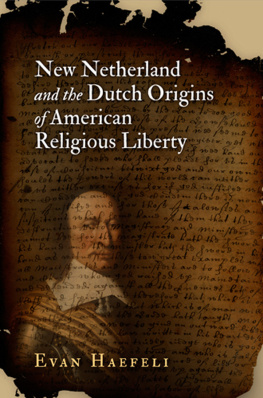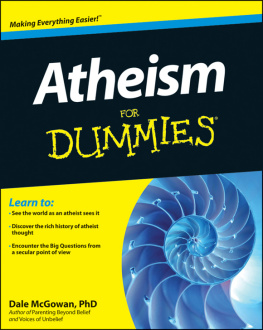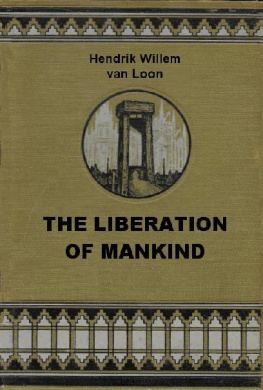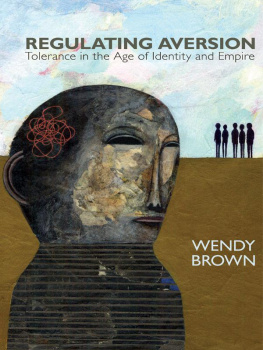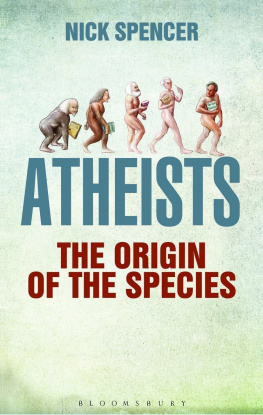Religious Tolerance from Renaissance to Enlightenment
This new study examines the relationship of atheism to religious tolerance from the Renaissance to the Enlightenment in a broad array of literary texts and political and religious controversies written in Latin and the vernacular primarily in France, the Netherlands, and Switzerland. The main authors featured are Desiderius Erasmus, Sebastian Castellio, Jean Bodin, Michel de Montaigne, Dirck Coornhert, Justus Lipsius, Gisbertus Voetius, the anonymous Theophrastus redivivus, and Pierre Bayle. These authors reflect and inform changing attitudes to religious tolerance inspired by a complete reconceptualization of atheism over the course of three centuries of literary and intellectual history. By integrating the history of tolerance in the history of atheism, Religious Tolerance from Renaissance to Enlightenment: Atheists Progress should prove stimulating to historians of philosophy as well as literary specialists and students of Reformation history.
Eric MacPhail is Professor of French and Comparative Literature at Indiana University.
Routledge Research in Early Modern History
Maurits of Nassau and the Survival of the Dutch Revolt
Comparative Insurgences
Nick Ridley
The Economic Causes of the English Civil War
Freedom of Trade and the English Revolution
George Yerby
Edwin Sandys and the Reform of English Religion
Sarah L. Bastow
Murder, Justice, and Harmony in an Eighteenth-Century French Village
Nancy Locklin
The Dirty Secret of Early Modern Capitalism
The Global Reach of the Dutch Arms Trade, Warfare and Mercenaries in the Seventeenth Century
Kees Boterbloem
Languages of Reform in the Eighteenth Century
When Europe Lost Its Fear of Change
Edited by Susan Richter, Thomas Maissen, and Manuela Albertone
Religious Tolerance from Renaissance to Enlightenment
Atheists Progress
Eric MacPhail
Protestant Resistance in Counterreformation Austria
Peter Thaler
For more information about this series, please visit: www.routledge.com/Routledge-Research-in-Early-Modern-History/book-series/RREMH
First published 2020
by Routledge
52 Vanderbilt Avenue, New York, NY 10017
and by Routledge
2 Park Square, Milton Park, Abingdon, Oxon, OX14 4RN
Routledge is an imprint of the Taylor & Francis Group, an informa business
2020 Taylor & Francis
The right of Eric MacPhail to be identified as author of this work has been asserted b in accordance with sections 77 and 78 of the Copyright, Designs and Patents Act 1988.
All rights reserved. No part of this book may be reprinted or reproduced or utilised in any form or by any electronic, mechanical, or other means, now known or hereafter invented, including photocopying and recording, or in any information storage or retrieval system, without permission in writing from the publishers.
Trademark notice: Product or corporate names may be trademarks or registered trademarks, and are used only for identification and explanation without intent to infringe.
Library of Congress Cataloging-in-Publication Data
Names: MacPhail, Eric, author.
Title: Religious tolerance from Renaissance to Enlightenment : atheists
progress /Eric MacPhail.
Description: New York, NY : Routledge Taylor & Francis Group,
2020. | Series: Routledge research in early modern history | Includes
bibliographical references and index.
Identifiers: LCCN 2019043354 (print) | LCCN 2019043355
(ebook) | ISBN 9780367444228 (hbk) | ISBN 9781003009603
(ebk) | ISBN 9781000766882 (adobe pdf) | ISBN 9781000767179
(mobi) | ISBN 9781000767469 (epub)
Subjects: LCSH: AtheismHistory. | Religious toleranceHistory.
Classification: LCC BL2747.3 .M2635 2020 (print) | LCC BL2747.3
(ebook) | DDC 211/.80903dc23
LC record available at https://lccn.loc.gov/2019043354
LC ebook record available at https://lccn.loc.gov/2019043355
ISBN: 978-0-367-44422-8 (hbk)
ISBN: 978-1-003-00960-3 (ebk)
Typeset in Sabon
by Apex CoVantage, LLC
I would like to acknowledge the generous assistance of the following institutions: the Institute for European Studies of Indiana University, the Scaliger Institute of the Leiden University Library, the Newberry Library, and the H. Henry Meeter Center for Calvin Studies of Calvin University.
| Allen | Opus epistolarum Desiderii Erasmi Roterodami , ed. P. S. Allen et al. 12 vols. (Oxford, 19061958). References are to letter and line number. |
| ASD | Opera omnia Desiderii Erasmi Roterodami . In progress. (Amsterdam, 1969). References are to ordo , volume, and page. |
| CO | Ioannis Calvini Opera quae supersunt omnia , ed. Baum, Cunitz, and Reuss. 59 vols. (Brunswick and Berlin, 18631900). References are to volume and column number. |
| CSEL | Corpus Scriptorum Ecclesiasticorum Latinorum . In progress (Vienna, 1866). References are to volume and page number. |
| CWE | Collected Works of Erasmus . In progress. (Toronto, 1974). References are to volume, page, and line number, except for letters: letters use only Allen letter numbers with line numbers of the English translation. |
| LB | Desiderii Erasmi Roterodami opera omnia , ed. Jean Le Clerc. 10 vols. (Leiden, 17031706). References are to volume, column, and column section number. |
| OD | Pierre Bayle, Oeuvres diverses . 4 vols. (The Hague, 17271731). References are to volume and page number. |
| PL | Patrologiae cursus completus. Series Latina , ed. J.-P. Migne. 221 vols. (Paris, 18441864). References are to volume and column number. |
| WA | D. Martin Luthers Werke: kritische Gesamtausgabe . 136 vols. (Weimar, 18832009). References are to volume and page number. |
Lucien Febvre was surely right to characterize the Renaissance as un sicle qui veut croire. or rather a social status or experience. Is it passive or active? To formulate the question in this way redirects attention from the issue of clandestinity or dissimulation that has dominated recent scholarship on atheism and libertinism to a sort of communitarian understanding of theism that we no longer share with earlier periods of history. This approach entails less discovery and deciphering of clandestine texts and more attention to the routine accusations and warnings of atheism, formulated in Latin and the vernacular, throughout the sixteenth century, often in the context of confessional strife by the least passionate or partisan voices. These voices are not clandestine, and they are not even equivocal. They describe a phenomenon that they were thoroughly mentally equipped to comprehend.
We can begin with the crisis in the Calvinist community of the Low Countries in the 1540s, a crisis exacerbated primarily by Catholic persecution and secondarily by Calvins own intra-confessional intolerance. In the early years of the Reform, some converts sought martyrdom but rather more attempted to conceal their true beliefs in order to maintain their social status within a Catholic realm and a Catholic social order. This phenomenon, which Calvin helped to name Nicodemism, has been generally understood as a product of the psychology of fear. People were afraid to affirm their true religious identity at the expense of their life or livelihood. If we attend to contemporary descriptions of religious dis-simulation during the Reformation, we can see that the barriers to the profession of the new faith were not merely or primarily psychological. The phenomenon of Nicodemism had reached sufficient proportions by 1543 that Calvin thought it necessary to compose a vernacular treatise showing what the faithful are to do when living among Roman Catholics. The burden of his argument is that participation in the Catholic mass or in any ceremony where prayers are offered to the Saints is a form of idolatry that incurs spiritual pollution and that cannot be forgiven by man or God. To those Calvinists whose social status required attendance at mass, Calvin says, Youre out of luck. This advice was not universally welcome, as we know from a key testimony rendered by the Strasbourg Reformer Valrand Poullain about the first diffusion of Calvins Petit trait in the Flemish Low Countries. This is a key testimony because it helps us relate the early-modern usage of atheism to the problem of religious tolerance, or rather the problem of Calvins intolerance of backsliding Calvinists.

